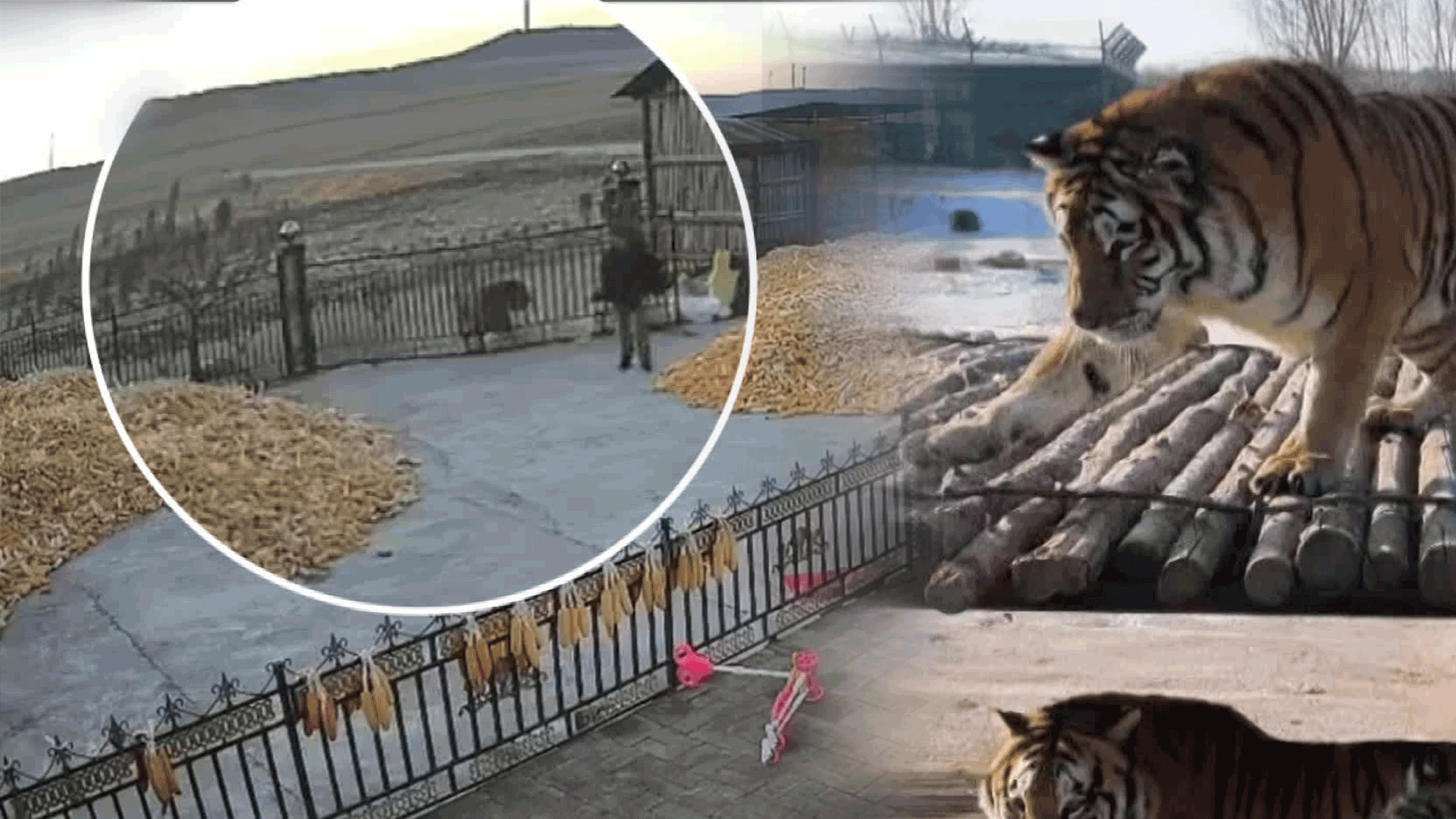[Anchor]
In the northeastern region of China, the Siberian tiger has been appearing around residential areas.
As an endangered species, it needs protection, but an increase in its population could pose a threat to humans, which has left Chinese authorities in a dilemma.
Kim Min-jung in Beijing reports.
[Report]
On a two-lane mountain road, a tiger suddenly appears.
It strolls leisurely, ignoring both vehicles and motorcycles on the road.
This is the endangered Baekdu Mountain or Siberian tiger.
[Tiger Witness/Beijing Youth Daily Interview: "I couldn't make a U-turn or stop, so I had no choice but to keep going forward."]
Local residents said that the tiger appeared in the village this spring and was seen eating cattle.
In November of last year, a tiger approached a residential area in another region and attacked a person.
This is believed to have occurred due to a lack of food in the wild.
The Chinese government has been working to breed the Siberian tiger, which is on the brink of extinction.
At the protection facility 'Northeast Tiger Forest Park,' the number of tigers has increased from 8 in the 1980s to over 1,100 in the 2010s.
Recently, some facilities have faced criticism for poor breeding conditions due to an excess of tigers.
[Tiger Protection Facility Visitor/Chinese social media: "Look at the food given to the tigers. The chicken bones and peaches are all rotten."]
Now, there are concerns about returning them to the wild, but the issue is coexistence with humans.
If the Siberian tiger is released into the wild solely for the purpose of 'species restoration,' it could harm humans if food is scarce or if its activity range expands.
With calls growing for a full restoration of local ecosystems and food chains before any wild release, coexistence with humans has now emerged as the central challenge.
This is Kim Min-jung from KBS News in Beijing.
In the northeastern region of China, the Siberian tiger has been appearing around residential areas.
As an endangered species, it needs protection, but an increase in its population could pose a threat to humans, which has left Chinese authorities in a dilemma.
Kim Min-jung in Beijing reports.
[Report]
On a two-lane mountain road, a tiger suddenly appears.
It strolls leisurely, ignoring both vehicles and motorcycles on the road.
This is the endangered Baekdu Mountain or Siberian tiger.
[Tiger Witness/Beijing Youth Daily Interview: "I couldn't make a U-turn or stop, so I had no choice but to keep going forward."]
Local residents said that the tiger appeared in the village this spring and was seen eating cattle.
In November of last year, a tiger approached a residential area in another region and attacked a person.
This is believed to have occurred due to a lack of food in the wild.
The Chinese government has been working to breed the Siberian tiger, which is on the brink of extinction.
At the protection facility 'Northeast Tiger Forest Park,' the number of tigers has increased from 8 in the 1980s to over 1,100 in the 2010s.
Recently, some facilities have faced criticism for poor breeding conditions due to an excess of tigers.
[Tiger Protection Facility Visitor/Chinese social media: "Look at the food given to the tigers. The chicken bones and peaches are all rotten."]
Now, there are concerns about returning them to the wild, but the issue is coexistence with humans.
If the Siberian tiger is released into the wild solely for the purpose of 'species restoration,' it could harm humans if food is scarce or if its activity range expands.
With calls growing for a full restoration of local ecosystems and food chains before any wild release, coexistence with humans has now emerged as the central challenge.
This is Kim Min-jung from KBS News in Beijing.
■ 제보하기
▷ 카카오톡 : 'KBS제보' 검색, 채널 추가
▷ 전화 : 02-781-1234, 4444
▷ 이메일 : kbs1234@kbs.co.kr
▷ 유튜브, 네이버, 카카오에서도 KBS뉴스를 구독해주세요!
- Tiger sightings in China
-
- 입력 2025-07-05 00:10:25

[Anchor]
In the northeastern region of China, the Siberian tiger has been appearing around residential areas.
As an endangered species, it needs protection, but an increase in its population could pose a threat to humans, which has left Chinese authorities in a dilemma.
Kim Min-jung in Beijing reports.
[Report]
On a two-lane mountain road, a tiger suddenly appears.
It strolls leisurely, ignoring both vehicles and motorcycles on the road.
This is the endangered Baekdu Mountain or Siberian tiger.
[Tiger Witness/Beijing Youth Daily Interview: "I couldn't make a U-turn or stop, so I had no choice but to keep going forward."]
Local residents said that the tiger appeared in the village this spring and was seen eating cattle.
In November of last year, a tiger approached a residential area in another region and attacked a person.
This is believed to have occurred due to a lack of food in the wild.
The Chinese government has been working to breed the Siberian tiger, which is on the brink of extinction.
At the protection facility 'Northeast Tiger Forest Park,' the number of tigers has increased from 8 in the 1980s to over 1,100 in the 2010s.
Recently, some facilities have faced criticism for poor breeding conditions due to an excess of tigers.
[Tiger Protection Facility Visitor/Chinese social media: "Look at the food given to the tigers. The chicken bones and peaches are all rotten."]
Now, there are concerns about returning them to the wild, but the issue is coexistence with humans.
If the Siberian tiger is released into the wild solely for the purpose of 'species restoration,' it could harm humans if food is scarce or if its activity range expands.
With calls growing for a full restoration of local ecosystems and food chains before any wild release, coexistence with humans has now emerged as the central challenge.
This is Kim Min-jung from KBS News in Beijing.
In the northeastern region of China, the Siberian tiger has been appearing around residential areas.
As an endangered species, it needs protection, but an increase in its population could pose a threat to humans, which has left Chinese authorities in a dilemma.
Kim Min-jung in Beijing reports.
[Report]
On a two-lane mountain road, a tiger suddenly appears.
It strolls leisurely, ignoring both vehicles and motorcycles on the road.
This is the endangered Baekdu Mountain or Siberian tiger.
[Tiger Witness/Beijing Youth Daily Interview: "I couldn't make a U-turn or stop, so I had no choice but to keep going forward."]
Local residents said that the tiger appeared in the village this spring and was seen eating cattle.
In November of last year, a tiger approached a residential area in another region and attacked a person.
This is believed to have occurred due to a lack of food in the wild.
The Chinese government has been working to breed the Siberian tiger, which is on the brink of extinction.
At the protection facility 'Northeast Tiger Forest Park,' the number of tigers has increased from 8 in the 1980s to over 1,100 in the 2010s.
Recently, some facilities have faced criticism for poor breeding conditions due to an excess of tigers.
[Tiger Protection Facility Visitor/Chinese social media: "Look at the food given to the tigers. The chicken bones and peaches are all rotten."]
Now, there are concerns about returning them to the wild, but the issue is coexistence with humans.
If the Siberian tiger is released into the wild solely for the purpose of 'species restoration,' it could harm humans if food is scarce or if its activity range expands.
With calls growing for a full restoration of local ecosystems and food chains before any wild release, coexistence with humans has now emerged as the central challenge.
This is Kim Min-jung from KBS News in Beijing.
-
-

김민정 기자 mjnews@kbs.co.kr
김민정 기자의 기사 모음
-
이 기사가 좋으셨다면
-
좋아요
0
-
응원해요
0
-
후속 원해요
0















이 기사에 대한 의견을 남겨주세요.